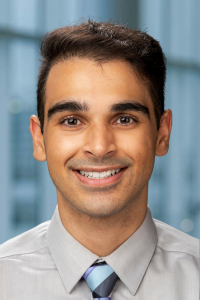Before he sat down to take the ABR Diagnostic Radiology Qualifying (Core) Exam in June, Ali Tejani, MD, did all the prep work.
The UT Southwestern Medical Center resident put in years of study, supplemented by case-based lectures at his program, materials provided by the ABR, and other sources. He completed the ABR’s Exam Readiness Check and answered the provided sample questions to gain familiarity with the remote platform.
At the start of the three-day exam, though, his webcam started acting up.

“Everything was working well, but then in the exam software, everything got really dark,” said Dr. Tejani, a diagnostic radiologist and one of 1,446 candidates to take the exam last month. “The concern was whether (exam monitors) could see me. Was I still meeting the requirements for being observed during the exam? I didn’t want to start the exam until that was clear.”
It was time to call the ABR’s Exam Day Help Desk. With the handy help desk flyer that includes contact information at his side, Dr. Tejani reached the ABR and, within minutes, was assured that everything was all right.
“They were able to talk to the people who were watching my video,” he said. “They were able to clear my video and, I think more importantly, they were able to message me using the exam software. I wasn’t just flying blind. Someone’s there watching and monitoring for these issues.”
Dr. Tejani contacted the Exam Day Help Desk two more times: when his video quality was impacted by a nearby storm in Dallas and when the identity verification process slowed as he was trying to re-enter the exam platform one afternoon.
He was relieved to know that calls to the desk didn’t affect his exam time. He also appreciated having a single ABR representative helping him instead of getting bounced around a phone tree.
“It was good to have an agent on the line who was working with me ensuring that (time on the phone) wouldn’t affect my time on the exam and staying with me until the problem was fixed,” he said.
Dr. Tejani took the exam at his program’s facilities, ensuring that he had information technology backup in case something went wrong. He followed the ABR’s suggestion to go through the Exam Readiness Check at the location and on the computer that he planned to use on exam day.
“Being able to experience the testing software makes sure that you’re not figuring that out on the first day of your exam,” he said. “When time is of the essence, you have this opportunity to hit the ground running. That was significant to me.”
Remote exams place responsibility on the examinee to have their technology in order and to locate an optimal location that will be free of distractions. UT Southwestern Medical Center officials knew the importance of arranging assistance. They set up dedicated exam space and provided IT staff well in advance of the event.
“I was fortunate to have support from my program knowing that there was a team of people with me along the way,” he said.
Dr. Tejani will complete his residency next June and head to a neuroradiology fellowship at the University of California, San Francisco. Even with the bulk of his training behind him, he remains available for fellow residents who need counsel as they prepare for the Qualifying (Core) Exam.
It’s one more layer of reassurance to help residents as they prepare to take the comprehensive exam.
“Every resident has a responsibility to be available as a resource,” he said. “Our field depends on future generations as leaders, and our small role is to make sure that they have the resources and knowledge that they need to one day be in the position that we’re in.”


